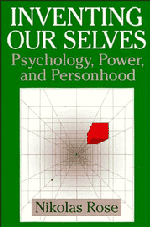Book contents
- Frontmatter
- Contents
- Acknowledgments
- Introduction
- 1 How should one do the history of the self?
- 2 A critical history of psychology
- 3 Psychology as a social science
- 4 Expertise and the techne of psychology
- 5 Psychology as an individualizing technology
- 6 Social psychology as a science of democracy
- 7 Governing enterprising individuals
- 8 Assembling ourselves
- Notes
- Bibliography
- Index
4 - Expertise and the techne of psychology
Published online by Cambridge University Press: 04 August 2010
- Frontmatter
- Contents
- Acknowledgments
- Introduction
- 1 How should one do the history of the self?
- 2 A critical history of psychology
- 3 Psychology as a social science
- 4 Expertise and the techne of psychology
- 5 Psychology as an individualizing technology
- 6 Social psychology as a science of democracy
- 7 Governing enterprising individuals
- 8 Assembling ourselves
- Notes
- Bibliography
- Index
Summary
Over the past half century, in the liberal, democratic, and capitalist societies of what we used to call the West, the stewardship of human conduct has become an intrinsically psychological activity. Psychological experts, psychological vocabularies, psychological evaluations, and psychological techniques have made themselves indispensable in the workplace and the marketplace, in the electoral process and the business of politics, in family life and sexuality, in pedagogy and child rearing, in the apparatus of law and punishment, and in the medico-welfare complex. Further, it is increasingly to psychologists that the citizens of such societies look when they seek to comprehend and surmount the problems that beset the human condition – despair, loss, tragedy, conflict – living their lives according to a psychological ethic. The rise of ‘the psychological’ is thus a phenomenon of considerable importance in attempting to understand the forms of life that we inhabit at the close of the twentieth century.
A number of authors have documented the expansion of the psychological domain, and have accounted for it in different ways (e.g., Lash, 1979, 1984; Bourdieu, 1984; Baritz, 1960; M. Rose, 1978; Rieff, 1966). Whatever the undoubted strengths of these accounts, they have tended to see psychology – and the psy knowledges and devices more generally – as little more than signs or effects of other, more fundamental, social or cultural changes, and indeed have tended to view these events as symptoms of a more general cultural malaise.
- Type
- Chapter
- Information
- Inventing our SelvesPsychology, Power, and Personhood, pp. 81 - 100Publisher: Cambridge University PressPrint publication year: 1996

